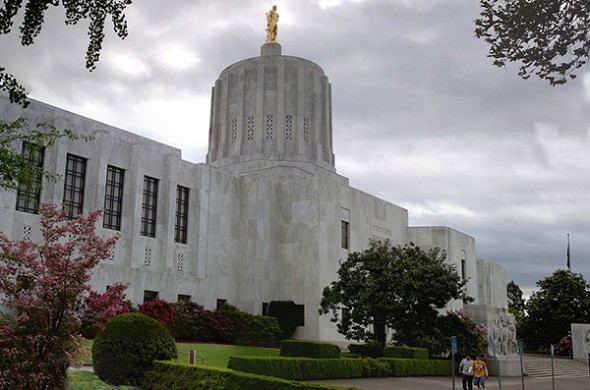Carrier of Last Resort in a Digital World
Posted on May 10, 2019 by Samuel Pastrick
Tags, Telecommunications

On May 7, after earlier passage through the Oregon House, HB 3065 moved out of the Senate Committee on Business and General Government. The full Senate will soon take up the bill and CUB expects it will pass quickly with substantial bipartisan support.
HB 3065 instructs the Oregon Public Utility Commission (PUC) to investigate – with input from CUB, telecommunications providers, and advocates for rural, low-income, and older adult customers – the extent to which the PUC’s current regulatory structure ensures adequate and reasonable access for customers to reliable, safe, affordable, and non-discriminatory telecommunications service in all parts of Oregon.
According to state law, PUC-certified retail telecommunication service providers providing local service in Oregon must: 1) deliver adequate and safe service, and 2) serve all customers in an adequate and nondiscriminatory manner. These two core responsibilities are referred to as “carrier of last resort” (COLR) obligations to ensure “universal service.”
The idea that government may designate COLRs is a cornerstone of public service regulation; the earliest historical application of COLR principles is found in English common law. The U.S. federal government and individual states first imposed COLR obligations on transportation in the 19th century, and later on critical utility services like electricity, water, and telecommunications as they were deemed necessary to everyday life.
COLRs are expected to benefit the public good by providing reliable, safe, affordable, and non-discriminatory service upon the request of any customer and regardless of their geographic location and social circumstance. Obligations to ensure universal service acknowledge that the cost effectiveness associated with delivery and upkeep of service depends on proximity to other resources and a reliable customer base. Because of this, COLR requirements are often linked to a funding mechanism in the form of either an implicit or explicit subsidy*.
Oregon and other state legislatures began regulating telecommunications universal service and COLR requirements, particularly after the break-up of the monopoly Bell system back in the mid-1980s and the passage of the 1996 federal Telecommunications Act. The 1996 Act heavily amended the original 1934 Communications Act to open local-exchange markets with the goal of increasing competition. The incumbent landline telephone providers serving Oregon customers, CenturyLink (formerly Qwest) and Frontier (formerly GTE), retained their COLR obligations, but “competitive local exchange” companies were allowed to compete them for service to customers.
Over the last 20 years, the telecommunications market has radically changed. For example, a recent Pew Research study finds that 77 percent of Americans now own smartphones, many of which are more powerful than personal computers from just a decade ago.
Yet many Oregonians and Americans in general, especially older adults and rural and low-income residents, still rely on landline telephone service. Competitive telecommunications markets do exist in many areas of Oregon and the U.S. at large, but those areas are generally high population density and high-income communities like Portland, Salem, Eugene, and Bend.
We must nevertheless recognize that the telecommunications industry has evolved due to rapid technological innovation and changing customer preference. In 1999, CenturyLink alone controlled half of the voice service market in Oregon in terms of total customer “lines”, while mobile service accounted for only 30 percent. As of 2017, mobile accounted for over 75 percent, while an increasing number of customers had opted to ditch their landlines in favor of VoIP, wireless service, standalone broadband, or more often some combination thereof.
The PUC no longer regulates incumbent landline carriers, CenturyLink and Frontier, as monopoly voice service providers. Yet Oregon law still requires both incumbent local exchange companies to maintain their COLR obligations. This regulatory versus statutory conflict raises legitimate questions. That being said, these obligations are essential to guarantee service for customers who, again, cannot participate in a competitive telecommunications market, and the Legislature must not prematurely eliminate COLR requirements altogether (as CenturyLink and others suggest).
CUB supports HB 3065 because it mandates the PUC to convene an inclusive and timely discussion about the role of COLR obligations as they relate to telecommunications service in an increasingly digital world. The overarching goal of the public process initiated by HB 3065 is for the PUC – either administratively through existing statute or perhaps through new legislation – to embrace an evolving industry while ensuring Oregonians’ access to reliable, safe, affordable, and non-discriminatory telecommunications service.
HB 3065 calls for a PUC report to the Legislature by fall of 2020. The bill names CUB as a key stakeholder in the PUC’s investigation. Stay tuned for further CUB reporting on this and other bills as they move through the session!
*In response to the 1996 Telecommunications Act, the 1999 Oregon legislature determined to compensate telecommunication carriers for their COLR requirements through the ratepayer-supported Oregon Universal Service Fund (OUSF). Since then, landline and eventually certain voice over internet protocol (VoIP) customers have supported the OUSF through an explicit subsidy in the form of a surcharge on the intrastate portion of their voice bills. A separate bill this legislative session, HB 2184, aims to modernize the OUSF. The CUB Blog reported on the progress of HB 2184 on January 30, and again on April 4. You can support CUB’s effort to pass HB 2184 here.
To keep up with CUB, like us on Facebook and follow us on Twitter!




09/05/22 | 0 Comments | Carrier of Last Resort in a Digital World